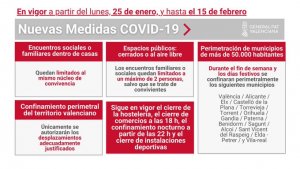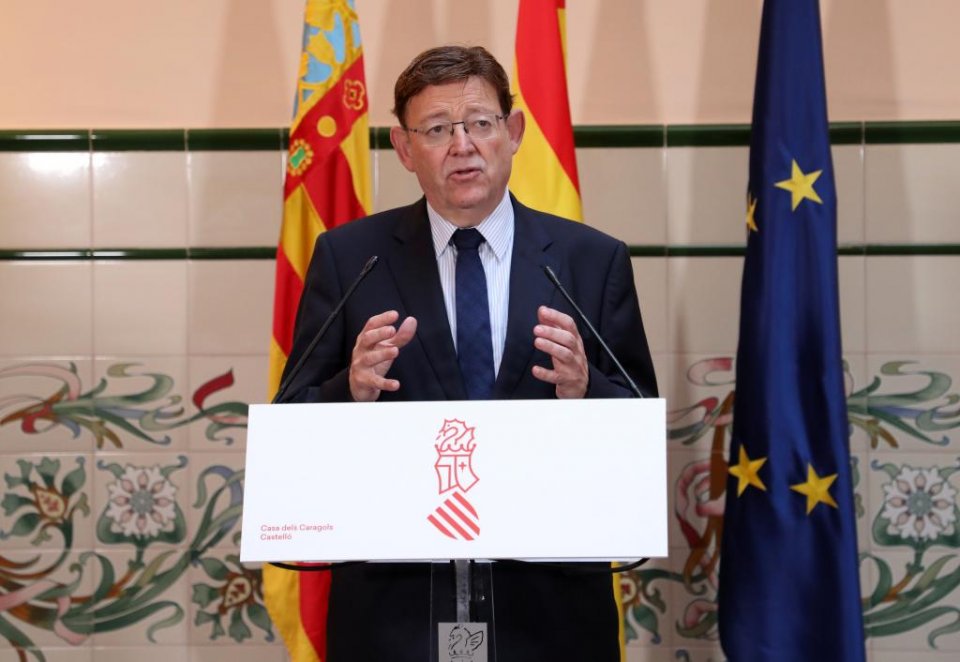Latest: Coronavirus in Spain figures (15 Feb)
New restrictions announced
The perimeters of cities and towns in the Valencia region with more than 50,000 inhabitants will be closed during weekends and holidays, the regional president Ximo Puig announced on Sunday. These are: Valencia, Alicante, Elche, Castelló, Torrevieja, Torrent, Orihuela, Gandia, Paterna, Benidorm, Sagunt, Alcoi, Sant Vicent del Raspeig, Elda-Petrer and Vila-real.
In addition, the perimeter confinement of the Valencian region as a whole is extended and meetings in private homes are prohibited, except between co-habitants. Only social gatherings of two people will be allowed in public spaces. Puig announced the measures on Sunday after a meeting with the regional health minister, Ana Barceló, and other officials. The new measures will come into force this Monday, once they are published in the ‘Official Gazette of the Generalitat Valenciana’, and will be in force until 15 February.

The new restrictions are a further attempt to curb the rapidly rising infection rates across the Valencia region. This week has seen a record 43,452 new infections and 531 deaths from Coronavirus in the region.
On Friday the vice president, Monica Oltra of the Compromís party, had announced a new decree being planned by the government which would ban socialising among different households. Exceptions would include those caring for children or old people as well as couples that don’t live together. She said they were also studying the idea of a support bubble for older people living alone to ‘avoid unwanted solitude’. However, according to Oltra, rather than having fines or other punishments, the new rule would be a question of ‘self-control’. ‘It’s not a question of giving you a fine, it’s that you could die. The penalty is death, but without knowing who is going to die,’ she explained.
While there may not be any fines or punishments, she said that someone who breaks the rules on socialising and whose sister dies after being infected will have the rest of their life to look at their orphaned nephews and nieces.
The Valencia region already saw tighter restrictions brought in last week, such as non-essential shops shutting at 6pm and the closure of sports facilities and all bars and restaurant for 14 days. Part of the regional government’s ‘shock’ plan was to bring down the evening curfew from 10pm to 8pm in an attempt to limit people mixing, as around 60% of Coronavirus infections occur from socialising. However, on Wednesday Spain’s central government refused the request brought by 12 of Spain’s regions, among them Valencia. Some regions, such as Andalusia, are appealing to citizens to ‘voluntarily’ stay at home after 8pm.
🔴 ÚLTIMA HORA
📢 @ximopuig anuncia 4 noves mesures davant la #COVID19
🏘️ "Els encontres familiars i socials dins de les cases queden limitats únicament al mateix nucli de convivència" pic.twitter.com/toGQg1NpIa
— Generalitat (@generalitat) January 24, 2021
Cafeterias being turned into hospital wards
The pressure on Valencia’s hospitals is relentless as infections continue to sky-rocket and space for beds is being created wherever possible. Elche and Alcoy Hospitals planned this weekend to begin converting cafeterias into Covid wards, while Alicante General Hospital is at 90% capacity.
Health sources in Alicante General have said the situation is critical with no margin to use spaces from specialist areas as the hospital is the regional reference centre for those specialities. Last Sunday Alicante’s ‘field’ hospital began receiving its first recovering Covid patients, those who have regained the ability to breathe more freely but still need care. At the moment it has 80 beds but this can be extended to 242.

There is a similar picture in Castellón, where the city’s ‘field’ hospital began receiving patients on Saturday, while the province’s three hospitals are practically at the limit of their capacity and have registered their worst week since the start of the pandemic.
But as fast as health departments find more capacity, those beds will be filled by the ever-increasing hospital admissions. During the past week alone the number of patients needing hospital care in the region went from 3,216 to 4,287. The situation in the intensive care units is equally concerning, with 592 people needing intensive care treatment as of Saturday, compared with 467 a week ago.
Recovery Plan criticised
Sectors which have been worst hit by Covid-19 are to receive €340 million in funding. The Plan Resiste, as it has been named, will help 21,000 businesses and 43,000 self-employed individuals who work in the tourism and hospitality industries.
However, the government plan has been criticised by some in the hospitality sector as they say the money offered is in the form of loans unlike other European countries where governments have given the money to businesses as payments.
On Thursday, as the new restrictions to close all bars and restaurants came into effect, many from the hospitality industry came out to protest, banging pots and pans outside the Palau de la Generalitat in Valencia.
Hui, acord entre totes les Administracions valencianes: 160 milions a les Ajudes Parèntesi.
Cada beneficiari -autònom o microempresa- dels sectors més afectats rebrà un fixe de 2.000 €, i un variable de 200 € per cada treballador a càrrec.
Hem de ser àgils, estar amb qui pateix pic.twitter.com/S5sIX4YD0s— Ximo Puig (@ximopuig) January 21, 2021
Vaccine queue jumpers
After three mayors were reprimanded last week for having the Covid-19 vaccine, despite not being in high-risk groups, this week it has been revealed that a further 150 local councillors and mayors have also had the jab. Regional president Ximo Puig has ordered an investigation and said that anyone who had the vaccine when they shouldn’t have, will now not be given the second dose.
The vaccine queue jumpers come from all political parties and, according to health department sources, may in fact number far more than 150.
Vaccine delays
The news of vaccine queue jumpers has angered many, as it comes as the number of vaccines being received from the pharmaceutical company, Pfizer, has also decreased. This week the Valencian region should have received 31,000 doses but only got 17,000, forcing the health authorities to slow down the vaccination programme just at a time when the aim was to ramp it up. In fact rather than continuing to call subsequent groups for their first doses, vaccines will have to be held back to be given to those who need their second jab 21 days after the first. In addition to this, calculations show that by the first week of February there could be serious problems guaranteeing the second dose for some patients.
So far 103,426 doses have been administered, 92.4% of those received, and 4% of people have refused the vaccine. The total figures for all regions up to Friday 22 January can be found here: Covid-19 Vaccinations in Spain
Another year without Fallas
With Valencia’s Fallas festival well and truly cancelled for this March, there is discussion about when the celebration should be rescheduled and if the corresponding school holidays should also be moved to a different date.

Valencia’s mayor Joan Ribó has said that he would be in favour of giving students free days at another time, but that it would be discussed by the city’s school council at a special meeting on 2 February. He also said there wouldn’t be Fallas during the first half of the year, although he believed it was too early to fix a date for when it could be celebrated. He said this would depend on the evolution of the pandemic and the effectiveness of the vaccine, but he reiterated that the city council would continue to help the Fallas industry keep its current structure in such complicated moments.
This week it was reported that the seven remaining artisan workshops which produce the exquisite fabric for the regional outfits are in danger of disappearing, as their output has dropped by a staggering 95% since the start of the pandemic. After a year of economic crisis, the cancellation of Fallas 2021 has come as a massive blow.
The festival, which takes place during the week leading up to 19 March, was cancelled last year for the first time since the Spanish Civil War. As an event which brings in millions of euros to the city, the council was very reluctant to cancel it and only did so at the eleventh hour.
Click here for all our reports from the Valencia Region
Click here for all previous reports on: Coronavirus in Spain
ALSO READ: Details of curfews & restrictions for all regions of Spain during ‘State of Alarm’
Sign up for the FREE Weekly Newsletter from Spain in English
Please support Spain in English with a donation.
Click here to get your business activity or services listed on our DIRECTORY



2 comments
The new rule about socialising in homes can’t be enforced because the police have no powers to enter homes without a court order, and have said so. That’s why Oltra has to make such vile statements as “It’s not a question of giving you a fine, it’s that you could die”.
These restrictions are totally OTT for a situation which is little different to the usual “gripe” epidemics that happen every winter. It’s about time we had our lives and businesses returned to us.
It makes me furious that all we hear about covid is the number of infections and the ridiculous measures to halt them. This article is even worse in that it’s using emotional blackmail to make people follow the rules, which make no sense whatsoever. How about, instead of simply quoting the number of infections (collected by using a very unreliable test) we’re told the number of people who test positive but show no signs of illness, or very little; the majority of people will fall into this category since, on the whole, it’s already- immune-suppressed elderly people who get sick and die. The chance of anyone else dying from covid is under 1%, but it would spoil the sensationalism of the media if we were informed of this. And wouldn’t you think that by now the ‘authorities’ would realise that all their ‘safety measures’ are obviously not working if the numbers keep rising, so why continue with them?